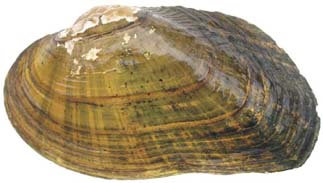Brook floater
Alasmidonta varicosa
 NH Conservation Status: Endangered
NH Conservation Status: Endangered
NH State Rank Status: Critically imperiled (globally vulnerable)
Distribution: Merrimack River (mainstem and various tributaries), Connecticut River (Croydon branch of Sugar River only), and Coastal (Lamprey River) watersheds.
Description: A medium sized mussel up to 3 inches and usually yellowish-green or brownish-black in color. The foot is orange or pinkish in color. Brook floaters often gape (relax their muscles and allow the shell to open) when removed from the water.
Commonly Confused Species: Dwarf wedgemussel, triangle floater, creeper
Habitat: Most commonly in rivers and streams with areas of riffles and coarse-sandy or cobble substrates. Not found in stagnant waters such as lakes and ponds.
Life History: Probably uses a variety of native fish hosts which may include the slimy sculpin, yellow perch, golden shiner, and longnose dace.
Conservation Threats: Major threats include pollution, dams, introduced species, sedimentation, flooding. Because brook floaters are restricted to flowing waters, areas impounded by dams are typically not suitable habitat. In addition to these broad threats, the species is very sensitive to mortality from local trampling by people wading and/or recreating in streams. The species is believed to be extirpated (no longer occur where did historically) from the Exeter River. Populations in the Lamprey River are now critically imperiled after heavy sediment, likely associated with several large storms from 2006-2009, buried and wiped out several once-robust populations. An extremely robust population in the Suncook River was discovered shortly after the river changed course following the 2006 mother’s day floods leaving a dewatered section of river; this site is now likely devoid of brook floater mussels due to the remaining shallow, stagnant warm water. Another upstream population in the Suncook River suffered substantial mortality following a combination of flooding (resulting in mussels scoured out and washed downstream) and drought (resulting in direct mortality and mussels more vulnerable to predators especially muskrats). Several other sites appear to be declining and/or consist of older individuals only. Considering New Hampshire is considered one of the strongholds for brook floater mussels, the global status of the species is of concern and is being evaluated.



